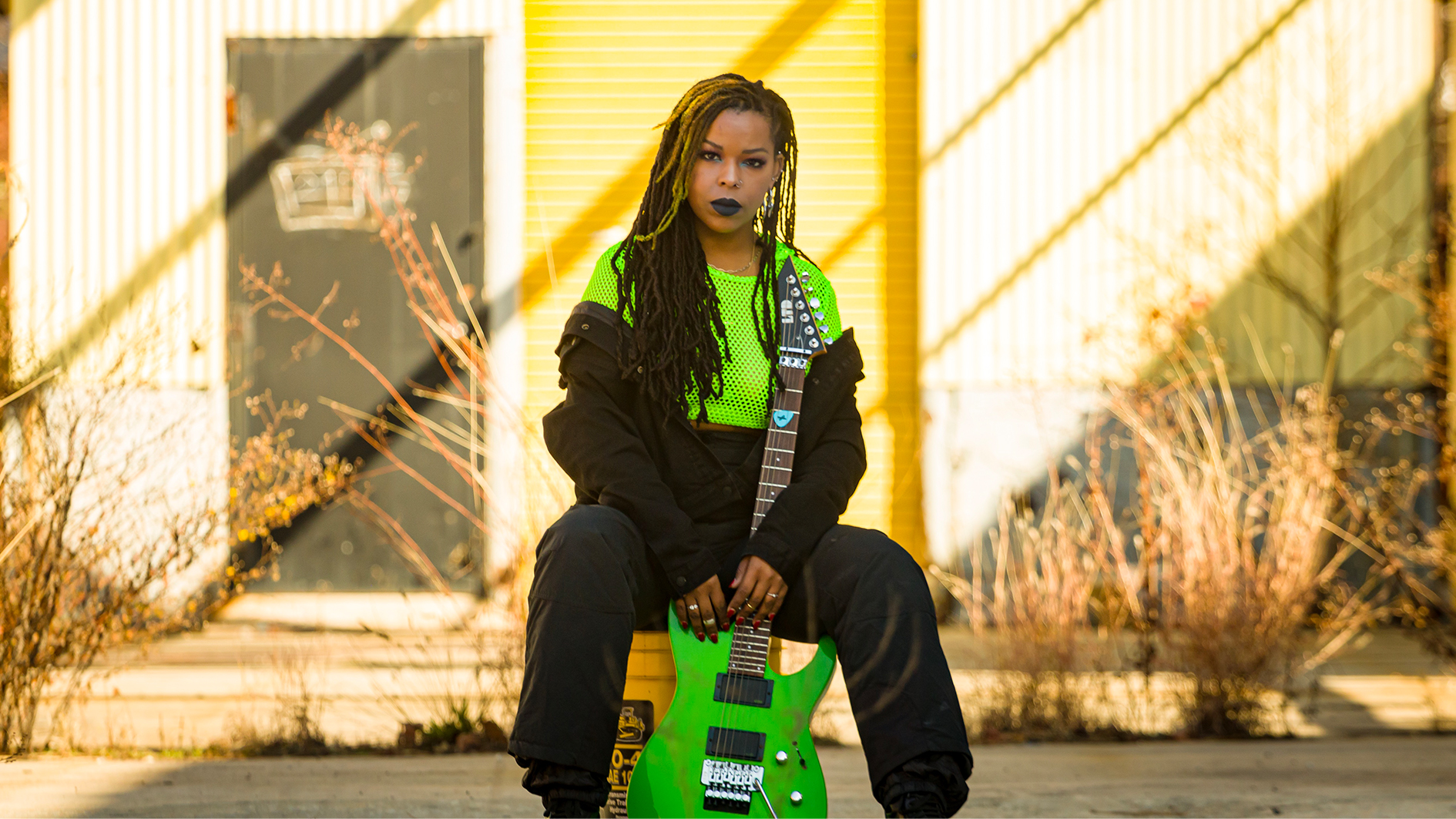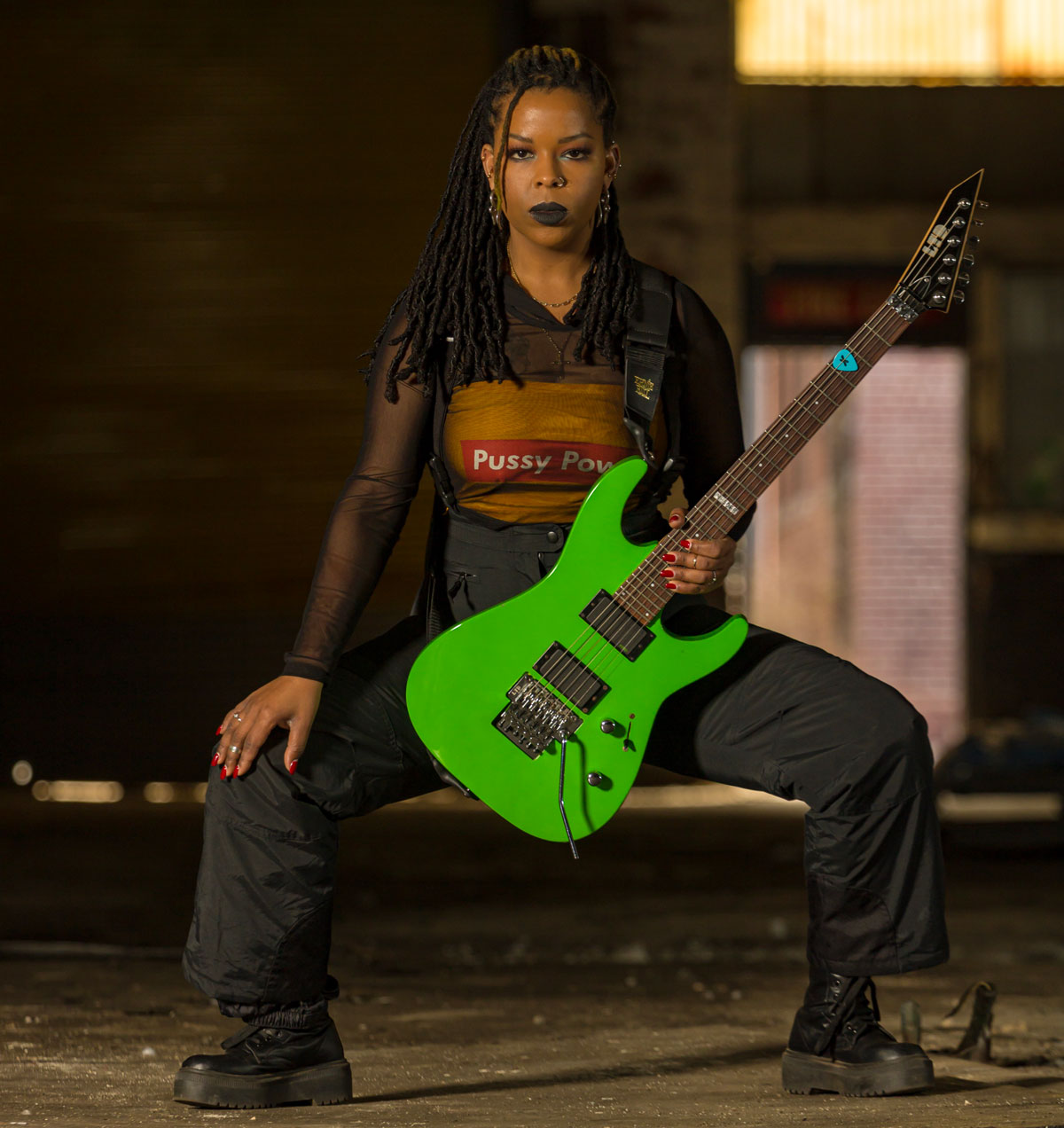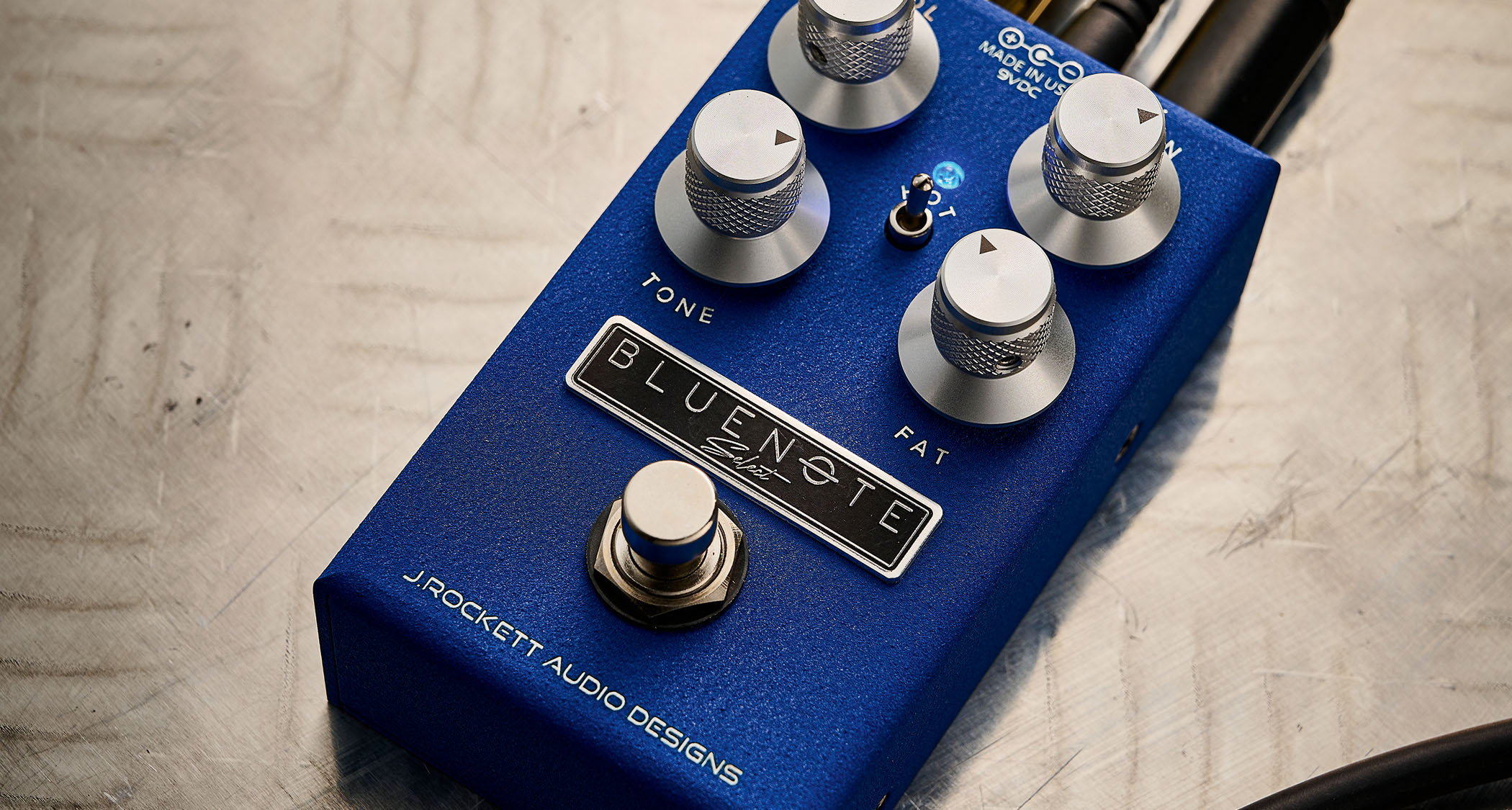Guitar Gabby: "Understanding where guitar music came from helps young black women like me, out here paving our own paths"
The LTD-wielding guitarist talks the music business, The TxLips Band and the genius of Sister Rosetta Tharpe

“I am happy to play my role in bringing the change that’s much-needed in this industry,” explains Gabriella ‘Guitar Gabby’ Logan, who manages and fronts her own collective, The TxLips Band.
Today the American singer/guitarist is speaking to Guitar World about how she’s creating a global platform for black women in music and hoping to inspire a diversity that’s still clearly lacking across all sectors of the industry. Her message is a powerful one that needs to be heard.
“I realized there was such a large gap in the industry for women musicians in general, but especially black women,” continues Gabby. “I didn’t see enough or any black women really, at the time.
"It reminded me of middle high school, starting to play guitar and having my own identity issues, figuring how to identify myself as a black woman in this world. So I decided to start something, first and foremost for the representation of black women, where we can control the narrative...
“I also wanted it to be a platform for women to participate and play music without having to sacrifice the other hats that we as women often have to wear in life. A lot of the ladies in the collective over the years, all of us come to think of it, work full-time jobs.
“Some are bankers, I’m a lawyer! A lot of them have been moms. There are a lot of hats we have to wear, so this collective makes sure we can play and do what we love without sacrificing anything else in life.”
As the founder of The TxLips Band, music has already taken Gabby far and wide, she’s spent the last two years touring in support of their Queens Of The New Age EP.
Get The Pick Newsletter
All the latest guitar news, interviews, lessons, reviews, deals and more, direct to your inbox!
The singer/guitarist also has a new solo album out, Musicology, which blends alternative rock with pop, psychedelic folk and a whole host of other sonic tapestries. The two projects live side-by-side and intertwine, with a growing network of professional musicians on call around the world...
Whenever I go out and tour or do studio sessions or music videos, I subcontract black women around the world to join in with me
“The band is a collective,” says Gabby, of her growing roster of talent. “Whenever I go out and tour or do studio sessions or music videos, I subcontract black women around the world to join in with me. Last September, one of my independent tour dates was in London and I didn’t have a drummer…
“Our player in the States didn’t come with us, so it was me with a keys player and bassist from Atlanta and a local girl called Lauren. I always work with professional musicians - they have the songs beforehand.
"Then we do rehearsals in that city, we do the show, everyone collects their money and I’m onto the next city. It’s a collective backing band to some degree!”
Tell us about your musical heroes growing up...
“I taught myself by listening to a lot of punk and grunge. Nirvana were one of my favorites - there was something so eloquently badass about how Kurt Cobain took what he was going through in life and expressed himself in his songs and lyrics.
"I really identified with how the expression came out of the music with that band. Then I got into Jimi Hendrix, who I absolutely love. It wasn’t until college when I learned about Sister Rosetta Tharpe.”
The Godmother Of Rock And Roll! That famous footage of her playing Up Above My Head is electrifying to watch...
“To this day, she’s still one of my biggest inspirations - not just for guitar, but how she carried herself in the era she was living in. Being one of very few women, especially black women, working in music during the American early 1900s can’t have been easy… and she just kicked ass. She knew who she was.
"I wish I’d heard of her when I was younger - I can only imagine how as a young black girl that would have looked and felt. She used to shred everyone’s brains out and then walk off stage in a clean white coat completely unscathed.
“I also love Orianthi, who I listened to a lot when I was starting out. Steve Vai is another hero of mine - he’s why one of my first guitars was an Ibanez RG. I remember hearing him and telling myself, ‘Okay, one day I’ve got to get to that level!’ And I’m still aspiring (laughs)!
"I love how Steve Vai manipulates guitars and sounds to give you this weird, wacky alien vibe. I’m in my studio office right now, looking at all my posters of the players I just listed...”
So how did you end up becoming a session player?
People who are not musicians have a hard time managing musicians
“I’m from Atlanta - well, between Atlanta and DC but mostly Atlanta - and growing up one of the records I used to listen to all the time was by Crime Mob. Back in 2016, management for one of the young ladies in the group, her name was Diamond, reached out to me and said she needed a guitarist for a music video she was doing. I went to the shoot and eventually started playing guitar for her when she would tour.
“I ended up pulling together the band and then started managing the band, because one thing I learned really quickly is that people who are not musicians have a hard time managing musicians. They don’t understand everything we need. So I started managing her group for her label and then simultaneously started The TxLips Band.”
You’ve written numerous articles and given countless seminars on self-management. What’s the most important piece of advice you tend to share?
“Whether you are an artist, musician or manager, it’s important to understand and know the basic fundamentals of what makes the music business a business.
"A lot of people use the words musician interchangeably, which they are to a certain degree, but there is a difference between those who play behind the artist and those who are the artist.
“Contracting is one of my personal areas of expertise - it comes from my enjoyment when it comes to law things! I remember for my very first out-of-state show with my band in 2016, I wrote my own contract.
"I thought I understood enough to draft something up, but there were things I didn’t think of to put in there. And to this day we still haven’t been paid! So you need to understand how and why the business works, at all levels from streaming to copyright.”
It’s often thought of as boring - but just about every kind of musician could benefit from being made aware of these things earlier on…
“I always stress this to musicians… your copyright is the legal protection of what you wrote or what you expressed. That’s everything you’ve gone through, all your experiences in life and how you relate to people is by expressing that.
Even if you don’t want to write your own contracts, just knowing what things should be red-flagged when you are given one to sign is extremely important
"If you don’t know how to protect that or end up granting over your rights to a label or somebody else, you might never get that back and eventually it will mess with your money.
"I want musicians to understand more things like that. Even if you don’t want to write your own contracts, just knowing what things should be red-flagged when you are given one to sign is extremely important.
“I use my platform to stress those things, through social media or training classes. All summer camps have gone virtual this year, so I’ve partnered with local girl rock camps around the world to bring classes about this stuff.
"That way they can understand what it means and they can carve their own path in the music industry. Form a business that can protect your work and the expression carried in your work. These are all important things to consider.”

How else can up-and-coming musicians prepare for a career in music?
“I would say branding and marketing that brand are so important. There are millions of talented people out there, who are wicked on one instrument… or all instruments, like Prince! But if you don’t know how to create and build a brand, the longevity will be very limited, that’s the nature of how this industry is.
"One day an artist is popular, the next day they are not. It might be because of people’s attention spans and they have nothing to relate to that brand. I had to do a lot to figure out what I wanted to achieve.
“That even goes for the guitar you play. I tie The TxLips and Guitar Gabby brands to my green guitar because it helps me stick in people’s heads! You need to know how to hit the right people at the right time and place. Instagram and Facebook are so overwhelmed with everybody doing everything.
Anyone who tours has to love a locking nut because you can just pick up a guitar, plug in and go
"It’s hard to make yourself stand out in a sea of other musicians in this crazy industry. Those who understand their brand enough to make it stick are the ones with longevity. Beyoncé is one name I think about. Prince was another. The same goes for Steve Vai… you see a DNA swirl or hear that tone, and you think of him straight away.”
Speaking of your neon green LTD, what’s the story behind that guitar?
“It very quickly became my main one! I got an endorsement with ESP about three or four years ago and it was the first one to pop my eye. That specific shade of green is my favorite color. I got it home and did some modifications to make it match better with my pedalboard setup and amp tones.
"It’s an M-50FR with a locking nut, which I really appreciate. Anyone who tours has to love a locking nut because you can just pick up a guitar, plug in and go. It has a Floyd Rose bridge which I love for divebombs in my solos.
“My current pickups are the EMG Kirk Hammett Bone Breaker set - I really like the sound of them. They’re active and high-output but enough flexibility to mould and switch around my tone as needed. I mostly use my analog 'board for studio work. When I tour, I don’t get to take everything so I switch to a Boss ME-50 multi-effects unit.
"The combination of the guitar and pickups has enough variation to work no matter what amp I’m using. What I look for usually is a tube amp with reverb, with more of a bassy and grungey kind of sound.
"It’s typically an Orange or a Fender for live stuff, though I actually prefer 50-watt Crate amps, which is what I have at home. To be honest, if I get anything with a good clean channel and reverb, I can make it work!”
What else can be done to encourage inclusivity on a wider level?
“A lot of it starts with listening. A lot of us as humans have a tendency to not listen to others when we feel we have our own point. Being able to sit down and hear about other people’s experiences, even if you don’t necessarily understand or agree, helps open up future conversations.
"We are all so different and yet so much more alike than we think. Making a conscious effort to understand someone else’s journey will make you a better person and the environment we are all in that much better.
Being able to understand where guitar-based music - which made a lot of people rich - came from can do wonders
“There’s so much online… Google is free! Go look at Sister Rosetta Tharpe. Even all these years later, people are obsessed with her, even more so in recent years. Looking at the history of where rock and roll came from or the history of blues can take people a long way.
"I was recently speaking to my reps about the lack of diversity on the business and marketing fronts, not just with them, but with a lot of companies all around the world. Being able to understand where guitar-based music - which made a lot of people rich - came from can do wonders.
"It will open up doors, expanding minds but also helping young black women like me, out here paving our own paths. It’s helping make sure that black women have a seat at the table instead of being behind the scenes like we always have been.”

It’s been amazing to see some exciting young players like Nandi Bushell emerge in recent years...
“I am absolutely amazed by that young girl and how much she inspires. If you are a young person of color and you see somebody that looks like you doing something that you want to do, it must feel like the whole world opens up. Suddenly, there are no limits to what you can do. I never had that when I was growing up… I can only imagine the inspiration other girls will feel watching her videos.
“When I saw Tom Morello had sent her one of his Soul Power guitars, I thought it was so fucking cool… and she’s still so young! I have so much respect and admiration for her. She’s putting on for the girls of the current generation and the ones behind her. And you have to remember she inspires not even young girls but adults as well. Honestly, I’m inspired by her every day...”
Musicology is out now.
Amit has been writing for titles like Total Guitar, MusicRadar and Guitar World for over a decade and counts Richie Kotzen, Guthrie Govan and Jeff Beck among his primary influences as a guitar player. He's worked for magazines like Kerrang!, Metal Hammer, Classic Rock, Prog, Record Collector, Planet Rock, Rhythm and Bass Player, as well as newspapers like Metro and The Independent, interviewing everyone from Ozzy Osbourne and Lemmy to Slash and Jimmy Page, and once even traded solos with a member of Slayer on a track released internationally. As a session guitarist, he's played alongside members of Judas Priest and Uriah Heep in London ensemble Metalworks, as well as handled lead guitars for legends like Glen Matlock (Sex Pistols, The Faces) and Stu Hamm (Steve Vai, Joe Satriani, G3).
“I always felt like that record could have been better if we had worked on it some more”: Looking for a blockbuster comeback album, Aerosmith turned to Van Halen producer Ted Templeman. For Joe Perry, it served as a learning experience
Guitar World Discussion: Who is the most underrated guitar player of all time?











